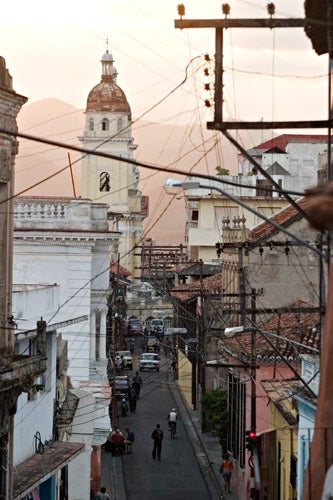On The Road: Some deep cleansing in the backstreets of Cuba

Your support helps us to tell the story
From reproductive rights to climate change to Big Tech, The Independent is on the ground when the story is developing. Whether it's investigating the financials of Elon Musk's pro-Trump PAC or producing our latest documentary, 'The A Word', which shines a light on the American women fighting for reproductive rights, we know how important it is to parse out the facts from the messaging.
At such a critical moment in US history, we need reporters on the ground. Your donation allows us to keep sending journalists to speak to both sides of the story.
The Independent is trusted by Americans across the entire political spectrum. And unlike many other quality news outlets, we choose not to lock Americans out of our reporting and analysis with paywalls. We believe quality journalism should be available to everyone, paid for by those who can afford it.
Your support makes all the difference.Angel said he would beat me and spit at me. I nodded in agreement at the prospect of this assault.
I'd met Angel in Parque Céspedes, the main plaza in Santiago de Cuba, and he took me to a dingy room in a wooden house in the Tivolí district of the city. I sat on a bed, eyeing the tea towels swinging across a line in the room, the makeshift kitchen and the Pope staring at me from a calendar while Angel prepared the instruments of battery.
Angel was a santero, a priest of the Afro-Cuban religion, Santería, a syncretic religion that blends Roman Catholicism with the Orisha gods of the West African religion of Yoruba. He'd agreed to perform a cleansing ceremony. He removed his top, wrapped a white cloth around his head, a black cloth around his stomach and harnessed a red cloth, embroidered with skull and crossbones, around his shoulder. Angel then asked me to stand in front of the altar. It was tiered and draped in a white sheet; each tier was lined with ceramic deities. The standout china statuette was Lazarus, his porcelain skin, pockmarked by sores. St Lazarus' alter ego is Babalú-Ayé, the deity of disease.
Angel sucked at a bottle of firewater and spat at me; he then toked his cigar and blew the smoke into my face. He then rubbed honey on to my legs and beat my limbs with leafy branches. As the chanting began, projectile liquor coated my face, leaves twitched my skin, and cigar smoke irritated my nostrils. Under instruction, I threw my hands up in the air and dived to place my palms flatly on the ground. I felt like a plate under attack in a dishwasher. As the increasingly frantic "Protector, help me!" pleas reached crescendo and the firewater continued to fly, the spiritual spell was shattered: a small boy entered the room, approached Angel from behind, and slapped him hard on the bottom.
Footprint's 'Caribbean Islands Handbook' (£14.99) is available now.
Join our commenting forum
Join thought-provoking conversations, follow other Independent readers and see their replies
Comments